Business Ethics Report: Evaluating Ethical Dilemmas in NHS Trust (UK)
VerifiedAdded on 2021/01/01
|10
|3382
|248
Report
AI Summary
This report provides a critical analysis of business ethics within the NHS Trust in England, focusing on ethical issues such as doctors receiving gifts from pharmaceutical suppliers and potential conflicts of interest. The report includes an overview of the case, a critical analysis addressing stakeholder theory, and recommendations for improving ethical practices. Two ethical theories, egoism and rights and justice, are applied to the case study to provide a comprehensive understanding of the ethical dimensions. The report highlights the impact of unethical behavior on stakeholders, including patients and investors, and suggests measures to promote transparency and ethical conduct within the NHS Trust. Examples of unethical conduct in similar organizations are also given. The report emphasizes the importance of ethical leadership and the need for clear guidelines to ensure fair practices in healthcare.
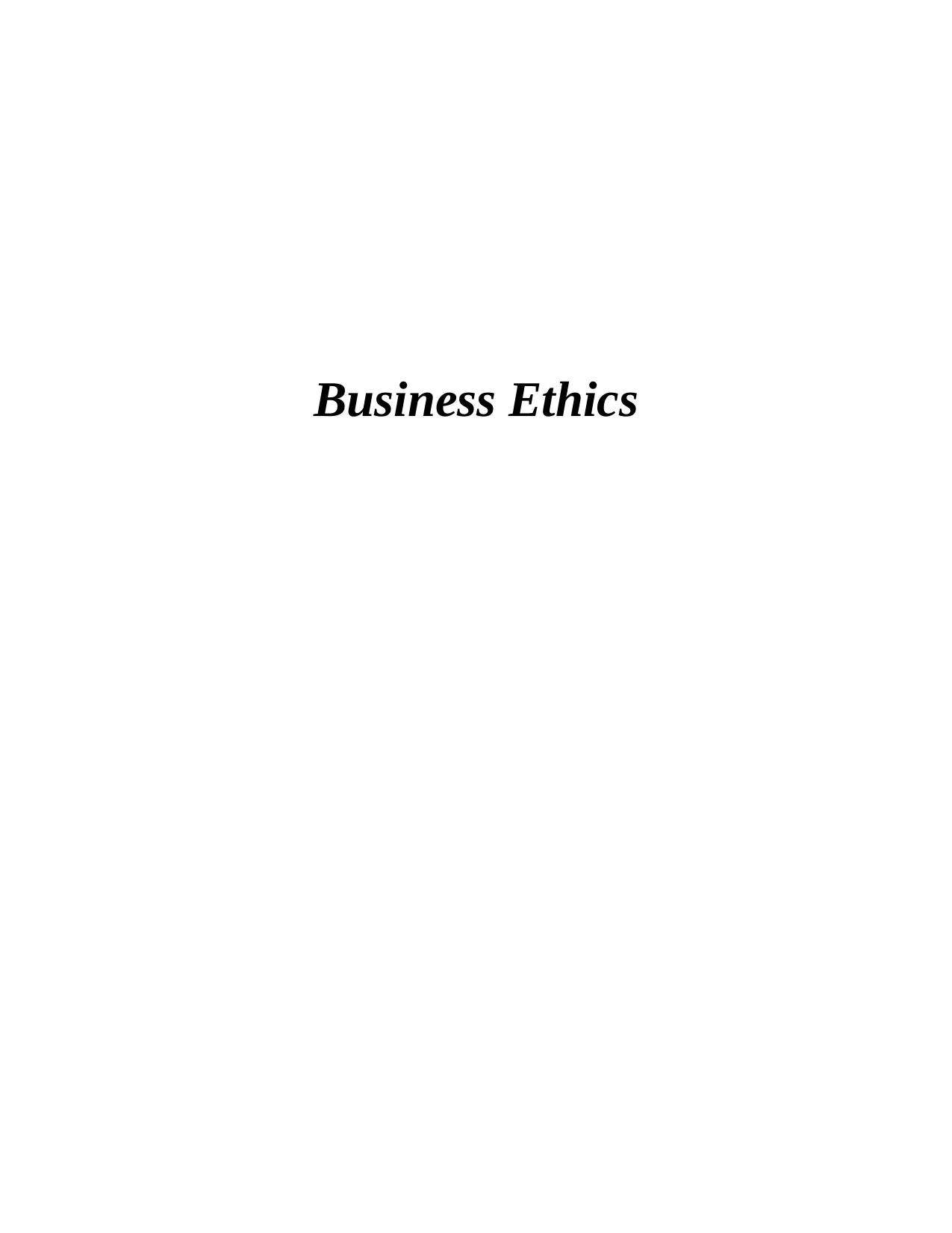
Business Ethics
Paraphrase This Document
Need a fresh take? Get an instant paraphrase of this document with our AI Paraphraser
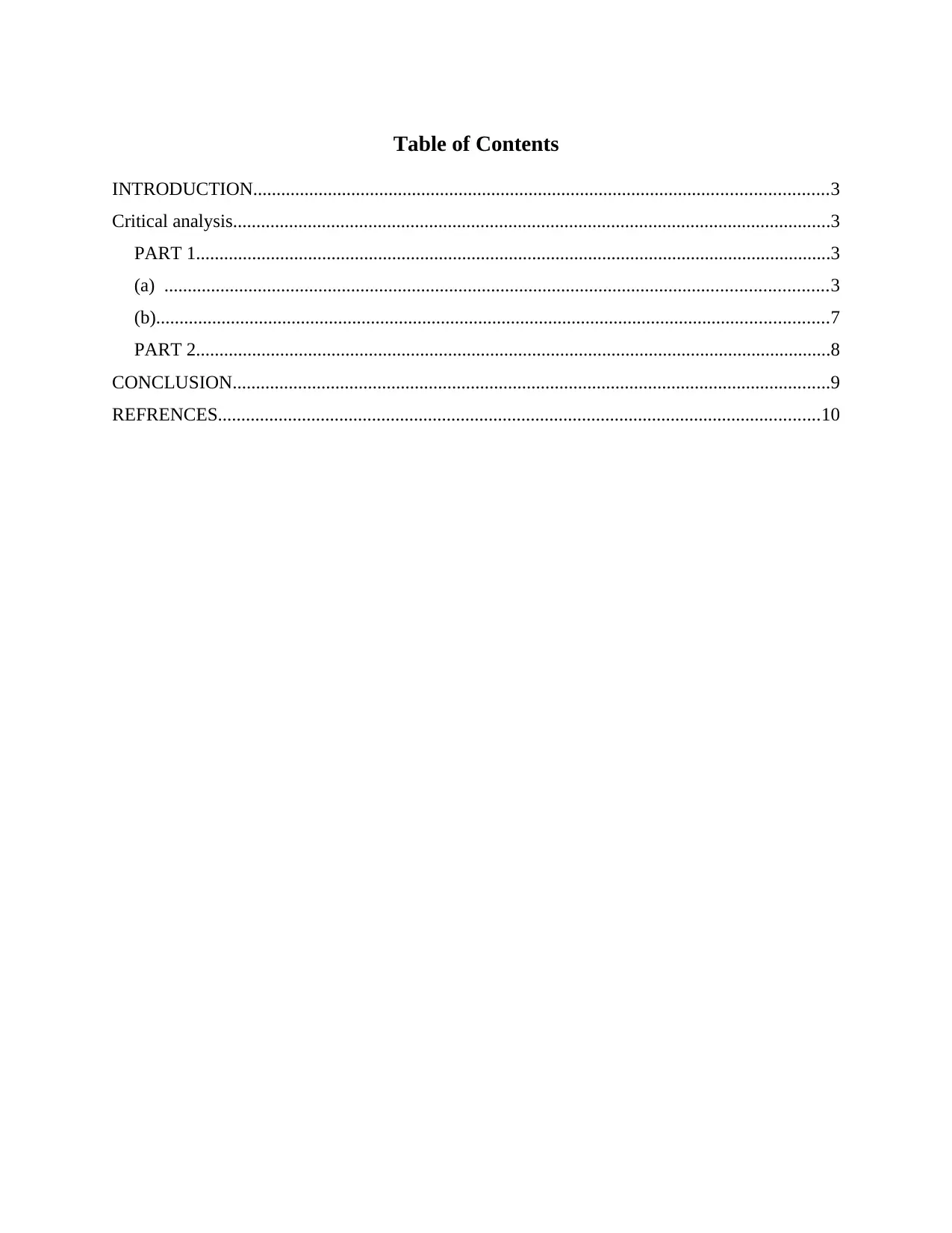
Table of Contents
INTRODUCTION...........................................................................................................................3
Critical analysis................................................................................................................................3
PART 1........................................................................................................................................3
(a) ..............................................................................................................................................3
(b)................................................................................................................................................7
PART 2........................................................................................................................................8
CONCLUSION................................................................................................................................9
REFRENCES.................................................................................................................................10
INTRODUCTION...........................................................................................................................3
Critical analysis................................................................................................................................3
PART 1........................................................................................................................................3
(a) ..............................................................................................................................................3
(b)................................................................................................................................................7
PART 2........................................................................................................................................8
CONCLUSION................................................................................................................................9
REFRENCES.................................................................................................................................10
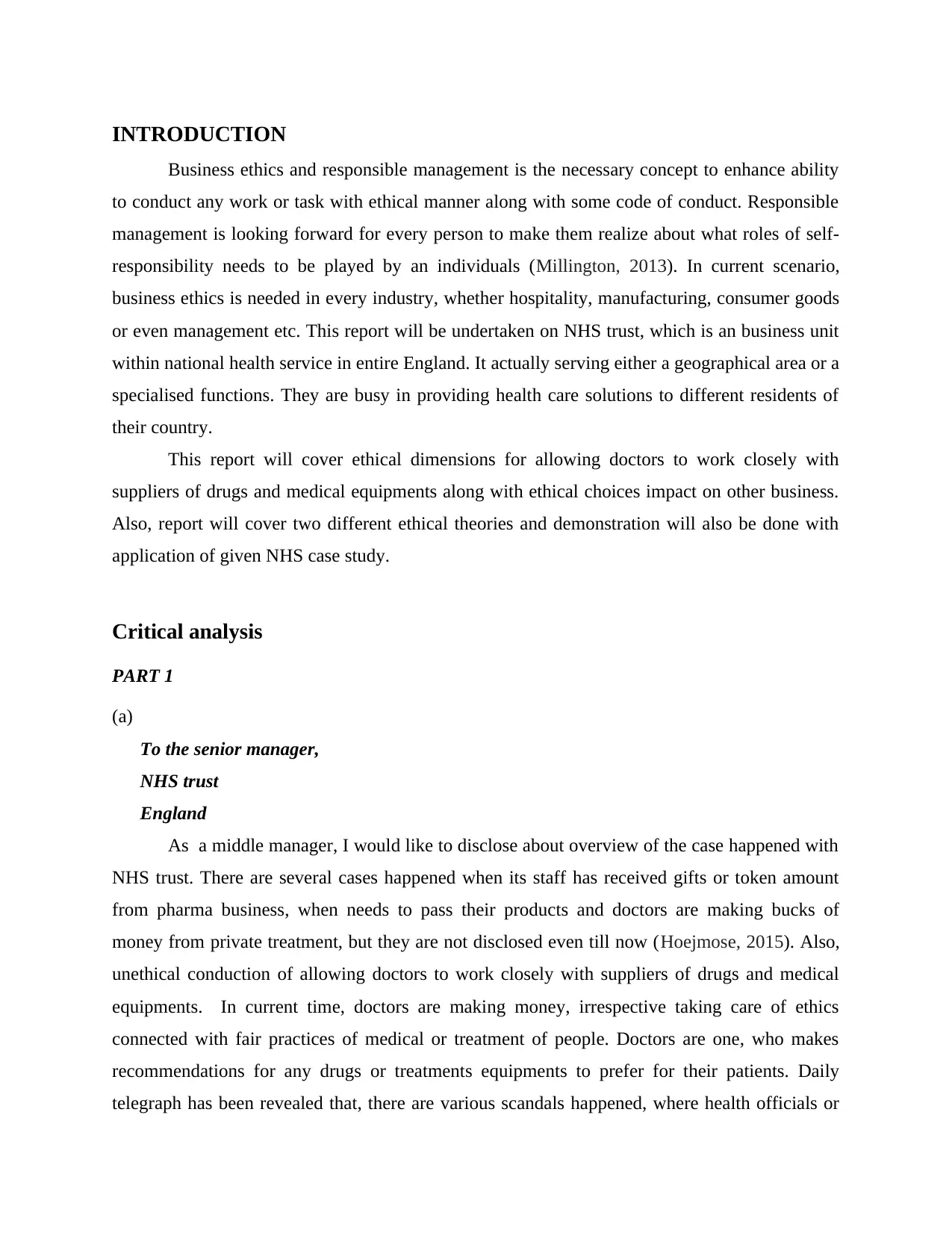
INTRODUCTION
Business ethics and responsible management is the necessary concept to enhance ability
to conduct any work or task with ethical manner along with some code of conduct. Responsible
management is looking forward for every person to make them realize about what roles of self-
responsibility needs to be played by an individuals (Millington, 2013). In current scenario,
business ethics is needed in every industry, whether hospitality, manufacturing, consumer goods
or even management etc. This report will be undertaken on NHS trust, which is an business unit
within national health service in entire England. It actually serving either a geographical area or a
specialised functions. They are busy in providing health care solutions to different residents of
their country.
This report will cover ethical dimensions for allowing doctors to work closely with
suppliers of drugs and medical equipments along with ethical choices impact on other business.
Also, report will cover two different ethical theories and demonstration will also be done with
application of given NHS case study.
Critical analysis
PART 1
(a)
To the senior manager,
NHS trust
England
As a middle manager, I would like to disclose about overview of the case happened with
NHS trust. There are several cases happened when its staff has received gifts or token amount
from pharma business, when needs to pass their products and doctors are making bucks of
money from private treatment, but they are not disclosed even till now (Hoejmose, 2015). Also,
unethical conduction of allowing doctors to work closely with suppliers of drugs and medical
equipments. In current time, doctors are making money, irrespective taking care of ethics
connected with fair practices of medical or treatment of people. Doctors are one, who makes
recommendations for any drugs or treatments equipments to prefer for their patients. Daily
telegraph has been revealed that, there are various scandals happened, where health officials or
Business ethics and responsible management is the necessary concept to enhance ability
to conduct any work or task with ethical manner along with some code of conduct. Responsible
management is looking forward for every person to make them realize about what roles of self-
responsibility needs to be played by an individuals (Millington, 2013). In current scenario,
business ethics is needed in every industry, whether hospitality, manufacturing, consumer goods
or even management etc. This report will be undertaken on NHS trust, which is an business unit
within national health service in entire England. It actually serving either a geographical area or a
specialised functions. They are busy in providing health care solutions to different residents of
their country.
This report will cover ethical dimensions for allowing doctors to work closely with
suppliers of drugs and medical equipments along with ethical choices impact on other business.
Also, report will cover two different ethical theories and demonstration will also be done with
application of given NHS case study.
Critical analysis
PART 1
(a)
To the senior manager,
NHS trust
England
As a middle manager, I would like to disclose about overview of the case happened with
NHS trust. There are several cases happened when its staff has received gifts or token amount
from pharma business, when needs to pass their products and doctors are making bucks of
money from private treatment, but they are not disclosed even till now (Hoejmose, 2015). Also,
unethical conduction of allowing doctors to work closely with suppliers of drugs and medical
equipments. In current time, doctors are making money, irrespective taking care of ethics
connected with fair practices of medical or treatment of people. Doctors are one, who makes
recommendations for any drugs or treatments equipments to prefer for their patients. Daily
telegraph has been revealed that, there are various scandals happened, where health officials or
⊘ This is a preview!⊘
Do you want full access?
Subscribe today to unlock all pages.

Trusted by 1+ million students worldwide
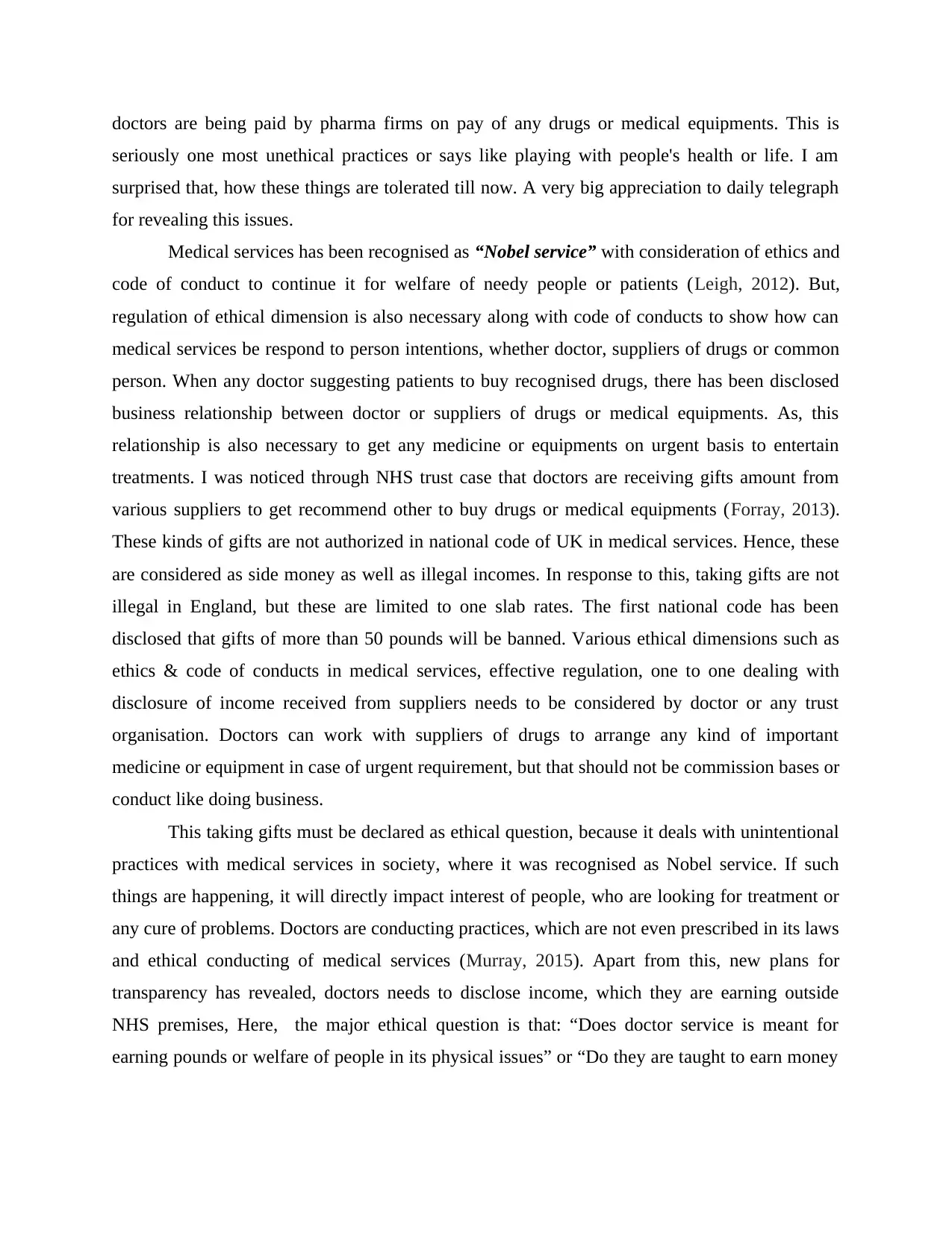
doctors are being paid by pharma firms on pay of any drugs or medical equipments. This is
seriously one most unethical practices or says like playing with people's health or life. I am
surprised that, how these things are tolerated till now. A very big appreciation to daily telegraph
for revealing this issues.
Medical services has been recognised as “Nobel service” with consideration of ethics and
code of conduct to continue it for welfare of needy people or patients (Leigh, 2012). But,
regulation of ethical dimension is also necessary along with code of conducts to show how can
medical services be respond to person intentions, whether doctor, suppliers of drugs or common
person. When any doctor suggesting patients to buy recognised drugs, there has been disclosed
business relationship between doctor or suppliers of drugs or medical equipments. As, this
relationship is also necessary to get any medicine or equipments on urgent basis to entertain
treatments. I was noticed through NHS trust case that doctors are receiving gifts amount from
various suppliers to get recommend other to buy drugs or medical equipments (Forray, 2013).
These kinds of gifts are not authorized in national code of UK in medical services. Hence, these
are considered as side money as well as illegal incomes. In response to this, taking gifts are not
illegal in England, but these are limited to one slab rates. The first national code has been
disclosed that gifts of more than 50 pounds will be banned. Various ethical dimensions such as
ethics & code of conducts in medical services, effective regulation, one to one dealing with
disclosure of income received from suppliers needs to be considered by doctor or any trust
organisation. Doctors can work with suppliers of drugs to arrange any kind of important
medicine or equipment in case of urgent requirement, but that should not be commission bases or
conduct like doing business.
This taking gifts must be declared as ethical question, because it deals with unintentional
practices with medical services in society, where it was recognised as Nobel service. If such
things are happening, it will directly impact interest of people, who are looking for treatment or
any cure of problems. Doctors are conducting practices, which are not even prescribed in its laws
and ethical conducting of medical services (Murray, 2015). Apart from this, new plans for
transparency has revealed, doctors needs to disclose income, which they are earning outside
NHS premises, Here, the major ethical question is that: “Does doctor service is meant for
earning pounds or welfare of people in its physical issues” or “Do they are taught to earn money
seriously one most unethical practices or says like playing with people's health or life. I am
surprised that, how these things are tolerated till now. A very big appreciation to daily telegraph
for revealing this issues.
Medical services has been recognised as “Nobel service” with consideration of ethics and
code of conduct to continue it for welfare of needy people or patients (Leigh, 2012). But,
regulation of ethical dimension is also necessary along with code of conducts to show how can
medical services be respond to person intentions, whether doctor, suppliers of drugs or common
person. When any doctor suggesting patients to buy recognised drugs, there has been disclosed
business relationship between doctor or suppliers of drugs or medical equipments. As, this
relationship is also necessary to get any medicine or equipments on urgent basis to entertain
treatments. I was noticed through NHS trust case that doctors are receiving gifts amount from
various suppliers to get recommend other to buy drugs or medical equipments (Forray, 2013).
These kinds of gifts are not authorized in national code of UK in medical services. Hence, these
are considered as side money as well as illegal incomes. In response to this, taking gifts are not
illegal in England, but these are limited to one slab rates. The first national code has been
disclosed that gifts of more than 50 pounds will be banned. Various ethical dimensions such as
ethics & code of conducts in medical services, effective regulation, one to one dealing with
disclosure of income received from suppliers needs to be considered by doctor or any trust
organisation. Doctors can work with suppliers of drugs to arrange any kind of important
medicine or equipment in case of urgent requirement, but that should not be commission bases or
conduct like doing business.
This taking gifts must be declared as ethical question, because it deals with unintentional
practices with medical services in society, where it was recognised as Nobel service. If such
things are happening, it will directly impact interest of people, who are looking for treatment or
any cure of problems. Doctors are conducting practices, which are not even prescribed in its laws
and ethical conducting of medical services (Murray, 2015). Apart from this, new plans for
transparency has revealed, doctors needs to disclose income, which they are earning outside
NHS premises, Here, the major ethical question is that: “Does doctor service is meant for
earning pounds or welfare of people in its physical issues” or “Do they are taught to earn money
Paraphrase This Document
Need a fresh take? Get an instant paraphrase of this document with our AI Paraphraser
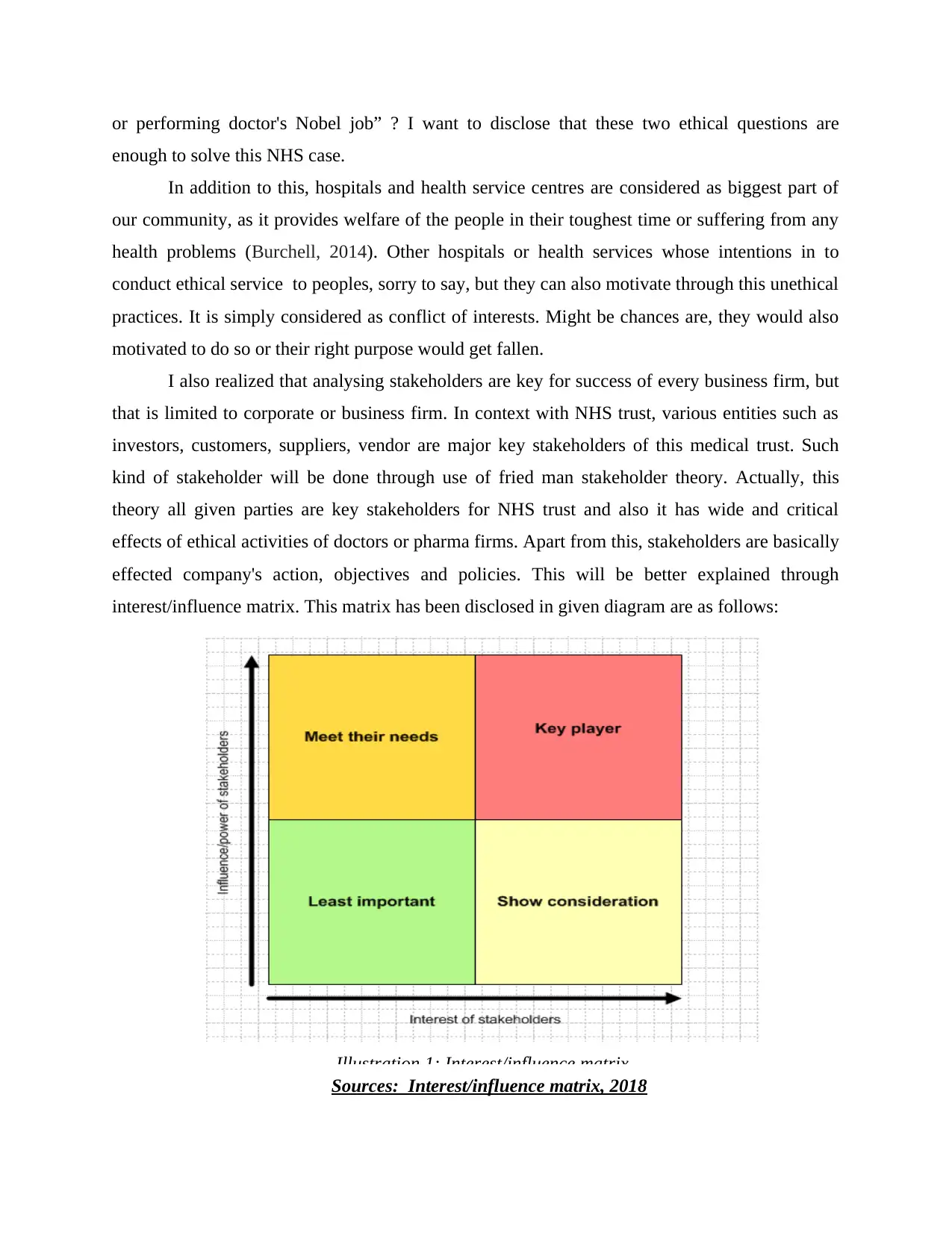
or performing doctor's Nobel job” ? I want to disclose that these two ethical questions are
enough to solve this NHS case.
In addition to this, hospitals and health service centres are considered as biggest part of
our community, as it provides welfare of the people in their toughest time or suffering from any
health problems (Burchell, 2014). Other hospitals or health services whose intentions in to
conduct ethical service to peoples, sorry to say, but they can also motivate through this unethical
practices. It is simply considered as conflict of interests. Might be chances are, they would also
motivated to do so or their right purpose would get fallen.
I also realized that analysing stakeholders are key for success of every business firm, but
that is limited to corporate or business firm. In context with NHS trust, various entities such as
investors, customers, suppliers, vendor are major key stakeholders of this medical trust. Such
kind of stakeholder will be done through use of fried man stakeholder theory. Actually, this
theory all given parties are key stakeholders for NHS trust and also it has wide and critical
effects of ethical activities of doctors or pharma firms. Apart from this, stakeholders are basically
effected company's action, objectives and policies. This will be better explained through
interest/influence matrix. This matrix has been disclosed in given diagram are as follows:
Illustration 1: Interest/influence matrix
Sources: Interest/influence matrix, 2018
enough to solve this NHS case.
In addition to this, hospitals and health service centres are considered as biggest part of
our community, as it provides welfare of the people in their toughest time or suffering from any
health problems (Burchell, 2014). Other hospitals or health services whose intentions in to
conduct ethical service to peoples, sorry to say, but they can also motivate through this unethical
practices. It is simply considered as conflict of interests. Might be chances are, they would also
motivated to do so or their right purpose would get fallen.
I also realized that analysing stakeholders are key for success of every business firm, but
that is limited to corporate or business firm. In context with NHS trust, various entities such as
investors, customers, suppliers, vendor are major key stakeholders of this medical trust. Such
kind of stakeholder will be done through use of fried man stakeholder theory. Actually, this
theory all given parties are key stakeholders for NHS trust and also it has wide and critical
effects of ethical activities of doctors or pharma firms. Apart from this, stakeholders are basically
effected company's action, objectives and policies. This will be better explained through
interest/influence matrix. This matrix has been disclosed in given diagram are as follows:
Illustration 1: Interest/influence matrix
Sources: Interest/influence matrix, 2018
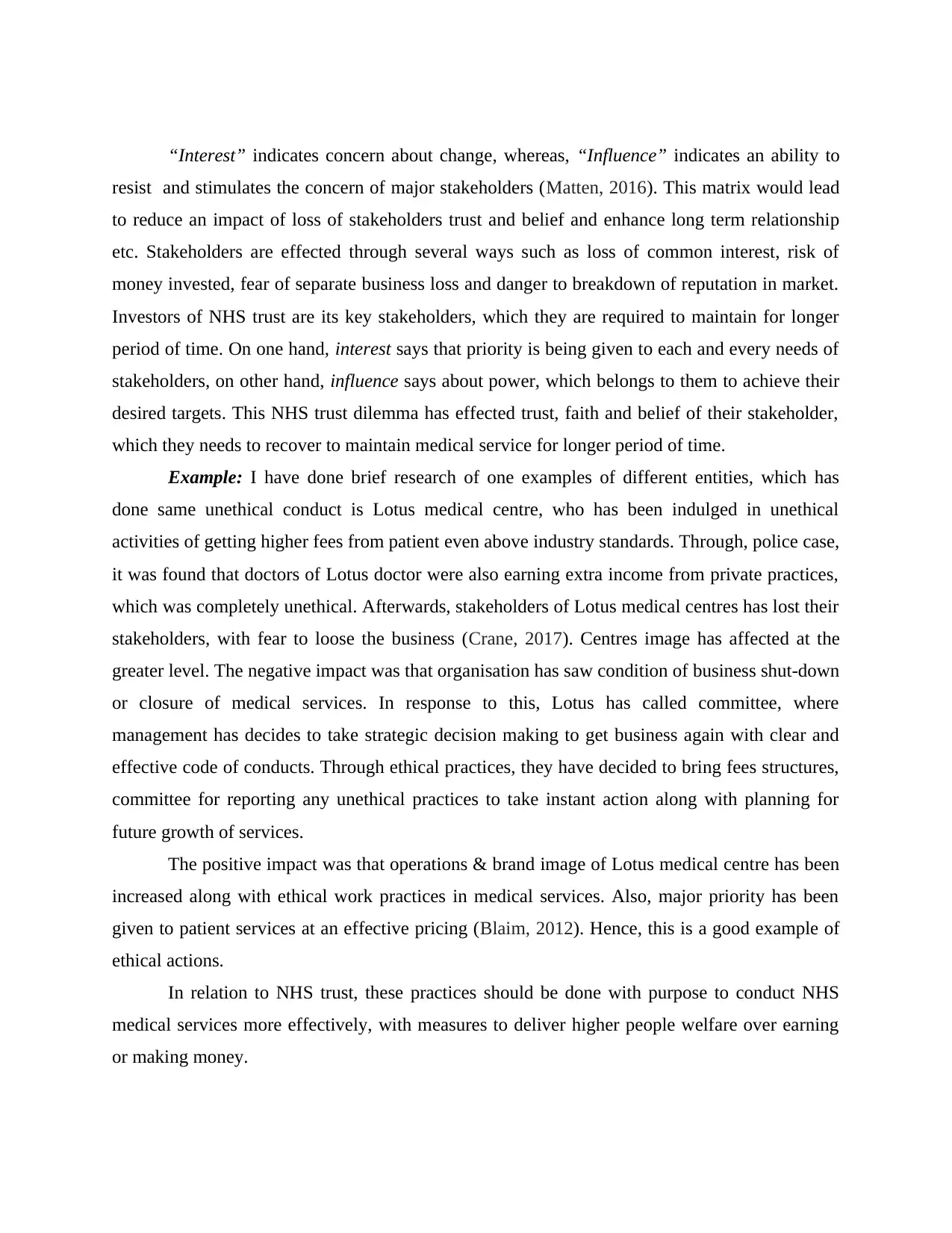
“Interest” indicates concern about change, whereas, “Influence” indicates an ability to
resist and stimulates the concern of major stakeholders (Matten, 2016). This matrix would lead
to reduce an impact of loss of stakeholders trust and belief and enhance long term relationship
etc. Stakeholders are effected through several ways such as loss of common interest, risk of
money invested, fear of separate business loss and danger to breakdown of reputation in market.
Investors of NHS trust are its key stakeholders, which they are required to maintain for longer
period of time. On one hand, interest says that priority is being given to each and every needs of
stakeholders, on other hand, influence says about power, which belongs to them to achieve their
desired targets. This NHS trust dilemma has effected trust, faith and belief of their stakeholder,
which they needs to recover to maintain medical service for longer period of time.
Example: I have done brief research of one examples of different entities, which has
done same unethical conduct is Lotus medical centre, who has been indulged in unethical
activities of getting higher fees from patient even above industry standards. Through, police case,
it was found that doctors of Lotus doctor were also earning extra income from private practices,
which was completely unethical. Afterwards, stakeholders of Lotus medical centres has lost their
stakeholders, with fear to loose the business (Crane, 2017). Centres image has affected at the
greater level. The negative impact was that organisation has saw condition of business shut-down
or closure of medical services. In response to this, Lotus has called committee, where
management has decides to take strategic decision making to get business again with clear and
effective code of conducts. Through ethical practices, they have decided to bring fees structures,
committee for reporting any unethical practices to take instant action along with planning for
future growth of services.
The positive impact was that operations & brand image of Lotus medical centre has been
increased along with ethical work practices in medical services. Also, major priority has been
given to patient services at an effective pricing (Blaim, 2012). Hence, this is a good example of
ethical actions.
In relation to NHS trust, these practices should be done with purpose to conduct NHS
medical services more effectively, with measures to deliver higher people welfare over earning
or making money.
resist and stimulates the concern of major stakeholders (Matten, 2016). This matrix would lead
to reduce an impact of loss of stakeholders trust and belief and enhance long term relationship
etc. Stakeholders are effected through several ways such as loss of common interest, risk of
money invested, fear of separate business loss and danger to breakdown of reputation in market.
Investors of NHS trust are its key stakeholders, which they are required to maintain for longer
period of time. On one hand, interest says that priority is being given to each and every needs of
stakeholders, on other hand, influence says about power, which belongs to them to achieve their
desired targets. This NHS trust dilemma has effected trust, faith and belief of their stakeholder,
which they needs to recover to maintain medical service for longer period of time.
Example: I have done brief research of one examples of different entities, which has
done same unethical conduct is Lotus medical centre, who has been indulged in unethical
activities of getting higher fees from patient even above industry standards. Through, police case,
it was found that doctors of Lotus doctor were also earning extra income from private practices,
which was completely unethical. Afterwards, stakeholders of Lotus medical centres has lost their
stakeholders, with fear to loose the business (Crane, 2017). Centres image has affected at the
greater level. The negative impact was that organisation has saw condition of business shut-down
or closure of medical services. In response to this, Lotus has called committee, where
management has decides to take strategic decision making to get business again with clear and
effective code of conducts. Through ethical practices, they have decided to bring fees structures,
committee for reporting any unethical practices to take instant action along with planning for
future growth of services.
The positive impact was that operations & brand image of Lotus medical centre has been
increased along with ethical work practices in medical services. Also, major priority has been
given to patient services at an effective pricing (Blaim, 2012). Hence, this is a good example of
ethical actions.
In relation to NHS trust, these practices should be done with purpose to conduct NHS
medical services more effectively, with measures to deliver higher people welfare over earning
or making money.
⊘ This is a preview!⊘
Do you want full access?
Subscribe today to unlock all pages.

Trusted by 1+ million students worldwide
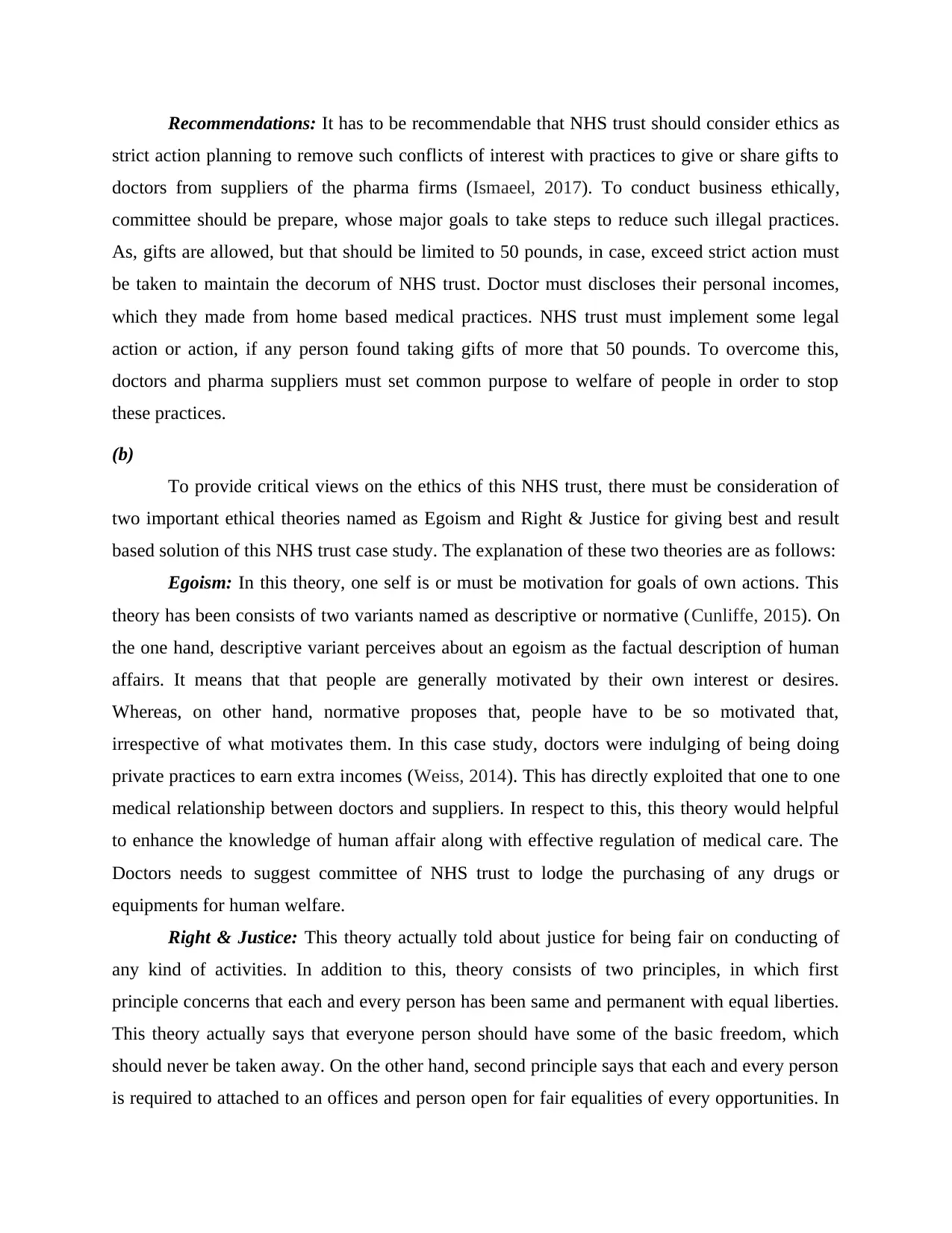
Recommendations: It has to be recommendable that NHS trust should consider ethics as
strict action planning to remove such conflicts of interest with practices to give or share gifts to
doctors from suppliers of the pharma firms (Ismaeel, 2017). To conduct business ethically,
committee should be prepare, whose major goals to take steps to reduce such illegal practices.
As, gifts are allowed, but that should be limited to 50 pounds, in case, exceed strict action must
be taken to maintain the decorum of NHS trust. Doctor must discloses their personal incomes,
which they made from home based medical practices. NHS trust must implement some legal
action or action, if any person found taking gifts of more that 50 pounds. To overcome this,
doctors and pharma suppliers must set common purpose to welfare of people in order to stop
these practices.
(b)
To provide critical views on the ethics of this NHS trust, there must be consideration of
two important ethical theories named as Egoism and Right & Justice for giving best and result
based solution of this NHS trust case study. The explanation of these two theories are as follows:
Egoism: In this theory, one self is or must be motivation for goals of own actions. This
theory has been consists of two variants named as descriptive or normative (Cunliffe, 2015). On
the one hand, descriptive variant perceives about an egoism as the factual description of human
affairs. It means that that people are generally motivated by their own interest or desires.
Whereas, on other hand, normative proposes that, people have to be so motivated that,
irrespective of what motivates them. In this case study, doctors were indulging of being doing
private practices to earn extra incomes (Weiss, 2014). This has directly exploited that one to one
medical relationship between doctors and suppliers. In respect to this, this theory would helpful
to enhance the knowledge of human affair along with effective regulation of medical care. The
Doctors needs to suggest committee of NHS trust to lodge the purchasing of any drugs or
equipments for human welfare.
Right & Justice: This theory actually told about justice for being fair on conducting of
any kind of activities. In addition to this, theory consists of two principles, in which first
principle concerns that each and every person has been same and permanent with equal liberties.
This theory actually says that everyone person should have some of the basic freedom, which
should never be taken away. On the other hand, second principle says that each and every person
is required to attached to an offices and person open for fair equalities of every opportunities. In
strict action planning to remove such conflicts of interest with practices to give or share gifts to
doctors from suppliers of the pharma firms (Ismaeel, 2017). To conduct business ethically,
committee should be prepare, whose major goals to take steps to reduce such illegal practices.
As, gifts are allowed, but that should be limited to 50 pounds, in case, exceed strict action must
be taken to maintain the decorum of NHS trust. Doctor must discloses their personal incomes,
which they made from home based medical practices. NHS trust must implement some legal
action or action, if any person found taking gifts of more that 50 pounds. To overcome this,
doctors and pharma suppliers must set common purpose to welfare of people in order to stop
these practices.
(b)
To provide critical views on the ethics of this NHS trust, there must be consideration of
two important ethical theories named as Egoism and Right & Justice for giving best and result
based solution of this NHS trust case study. The explanation of these two theories are as follows:
Egoism: In this theory, one self is or must be motivation for goals of own actions. This
theory has been consists of two variants named as descriptive or normative (Cunliffe, 2015). On
the one hand, descriptive variant perceives about an egoism as the factual description of human
affairs. It means that that people are generally motivated by their own interest or desires.
Whereas, on other hand, normative proposes that, people have to be so motivated that,
irrespective of what motivates them. In this case study, doctors were indulging of being doing
private practices to earn extra incomes (Weiss, 2014). This has directly exploited that one to one
medical relationship between doctors and suppliers. In respect to this, this theory would helpful
to enhance the knowledge of human affair along with effective regulation of medical care. The
Doctors needs to suggest committee of NHS trust to lodge the purchasing of any drugs or
equipments for human welfare.
Right & Justice: This theory actually told about justice for being fair on conducting of
any kind of activities. In addition to this, theory consists of two principles, in which first
principle concerns that each and every person has been same and permanent with equal liberties.
This theory actually says that everyone person should have some of the basic freedom, which
should never be taken away. On the other hand, second principle says that each and every person
is required to attached to an offices and person open for fair equalities of every opportunities. In
Paraphrase This Document
Need a fresh take? Get an instant paraphrase of this document with our AI Paraphraser
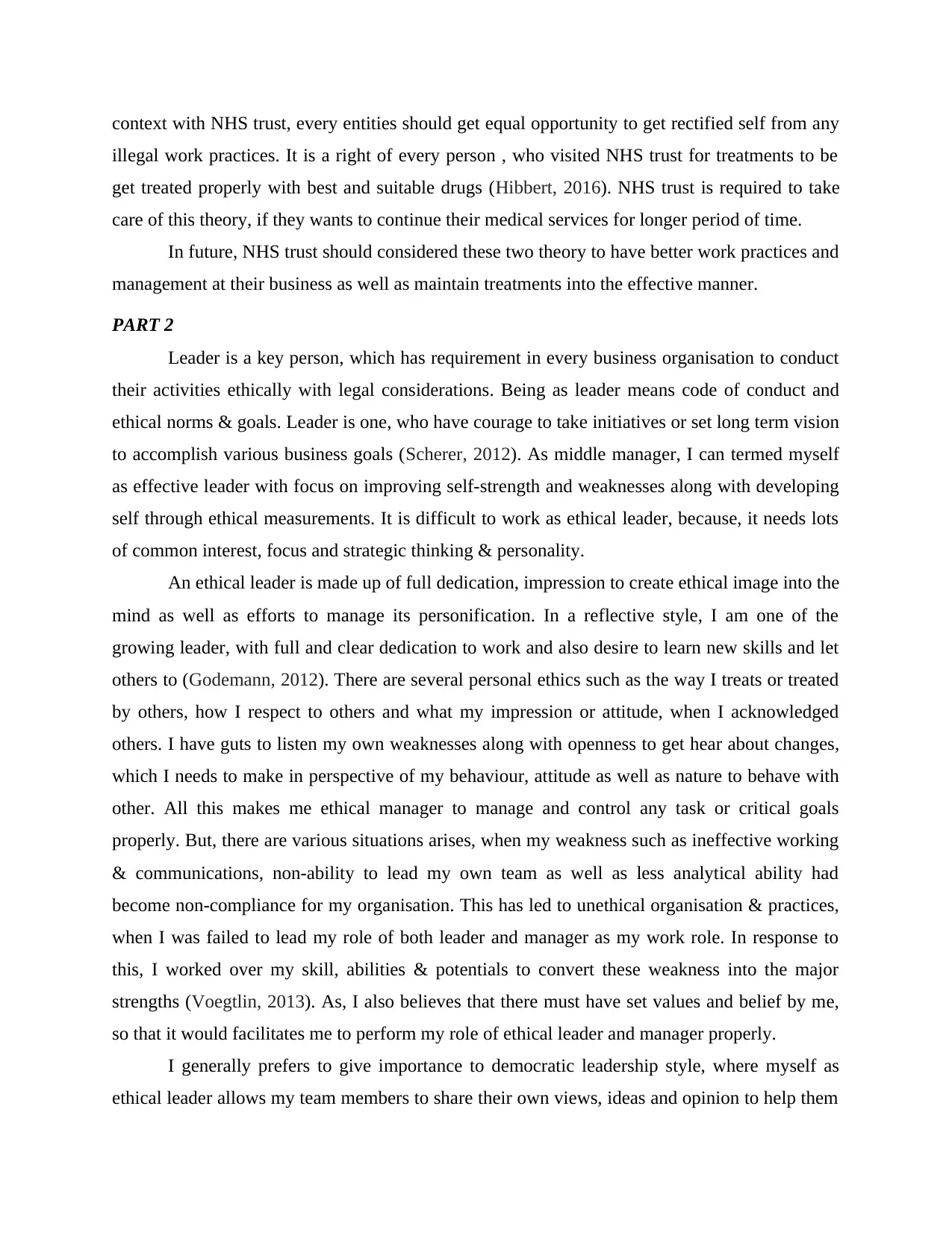
context with NHS trust, every entities should get equal opportunity to get rectified self from any
illegal work practices. It is a right of every person , who visited NHS trust for treatments to be
get treated properly with best and suitable drugs (Hibbert, 2016). NHS trust is required to take
care of this theory, if they wants to continue their medical services for longer period of time.
In future, NHS trust should considered these two theory to have better work practices and
management at their business as well as maintain treatments into the effective manner.
PART 2
Leader is a key person, which has requirement in every business organisation to conduct
their activities ethically with legal considerations. Being as leader means code of conduct and
ethical norms & goals. Leader is one, who have courage to take initiatives or set long term vision
to accomplish various business goals (Scherer, 2012). As middle manager, I can termed myself
as effective leader with focus on improving self-strength and weaknesses along with developing
self through ethical measurements. It is difficult to work as ethical leader, because, it needs lots
of common interest, focus and strategic thinking & personality.
An ethical leader is made up of full dedication, impression to create ethical image into the
mind as well as efforts to manage its personification. In a reflective style, I am one of the
growing leader, with full and clear dedication to work and also desire to learn new skills and let
others to (Godemann, 2012). There are several personal ethics such as the way I treats or treated
by others, how I respect to others and what my impression or attitude, when I acknowledged
others. I have guts to listen my own weaknesses along with openness to get hear about changes,
which I needs to make in perspective of my behaviour, attitude as well as nature to behave with
other. All this makes me ethical manager to manage and control any task or critical goals
properly. But, there are various situations arises, when my weakness such as ineffective working
& communications, non-ability to lead my own team as well as less analytical ability had
become non-compliance for my organisation. This has led to unethical organisation & practices,
when I was failed to lead my role of both leader and manager as my work role. In response to
this, I worked over my skill, abilities & potentials to convert these weakness into the major
strengths (Voegtlin, 2013). As, I also believes that there must have set values and belief by me,
so that it would facilitates me to perform my role of ethical leader and manager properly.
I generally prefers to give importance to democratic leadership style, where myself as
ethical leader allows my team members to share their own views, ideas and opinion to help them
illegal work practices. It is a right of every person , who visited NHS trust for treatments to be
get treated properly with best and suitable drugs (Hibbert, 2016). NHS trust is required to take
care of this theory, if they wants to continue their medical services for longer period of time.
In future, NHS trust should considered these two theory to have better work practices and
management at their business as well as maintain treatments into the effective manner.
PART 2
Leader is a key person, which has requirement in every business organisation to conduct
their activities ethically with legal considerations. Being as leader means code of conduct and
ethical norms & goals. Leader is one, who have courage to take initiatives or set long term vision
to accomplish various business goals (Scherer, 2012). As middle manager, I can termed myself
as effective leader with focus on improving self-strength and weaknesses along with developing
self through ethical measurements. It is difficult to work as ethical leader, because, it needs lots
of common interest, focus and strategic thinking & personality.
An ethical leader is made up of full dedication, impression to create ethical image into the
mind as well as efforts to manage its personification. In a reflective style, I am one of the
growing leader, with full and clear dedication to work and also desire to learn new skills and let
others to (Godemann, 2012). There are several personal ethics such as the way I treats or treated
by others, how I respect to others and what my impression or attitude, when I acknowledged
others. I have guts to listen my own weaknesses along with openness to get hear about changes,
which I needs to make in perspective of my behaviour, attitude as well as nature to behave with
other. All this makes me ethical manager to manage and control any task or critical goals
properly. But, there are various situations arises, when my weakness such as ineffective working
& communications, non-ability to lead my own team as well as less analytical ability had
become non-compliance for my organisation. This has led to unethical organisation & practices,
when I was failed to lead my role of both leader and manager as my work role. In response to
this, I worked over my skill, abilities & potentials to convert these weakness into the major
strengths (Voegtlin, 2013). As, I also believes that there must have set values and belief by me,
so that it would facilitates me to perform my role of ethical leader and manager properly.
I generally prefers to give importance to democratic leadership style, where myself as
ethical leader allows my team members to share their own views, ideas and opinion to help them
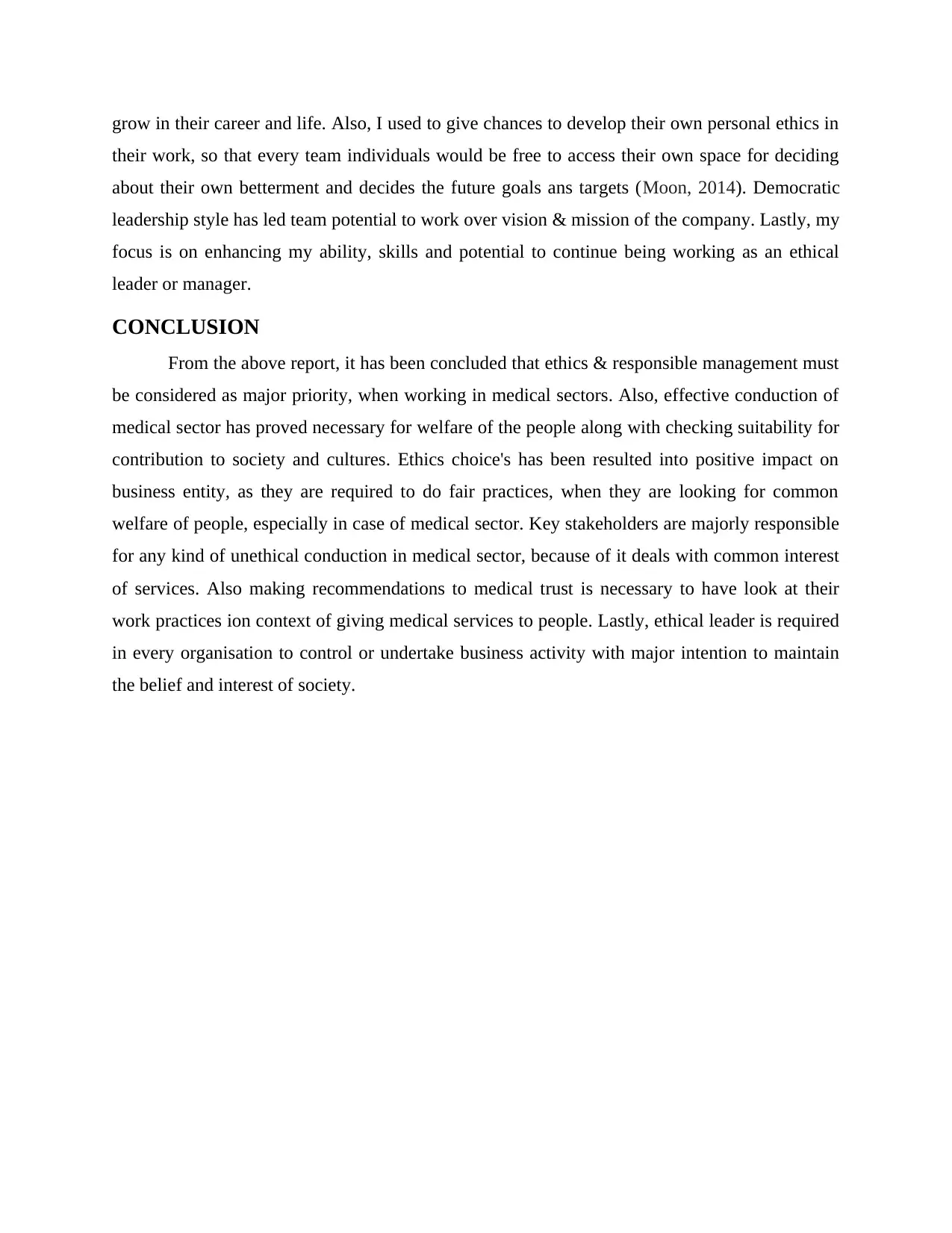
grow in their career and life. Also, I used to give chances to develop their own personal ethics in
their work, so that every team individuals would be free to access their own space for deciding
about their own betterment and decides the future goals ans targets (Moon, 2014). Democratic
leadership style has led team potential to work over vision & mission of the company. Lastly, my
focus is on enhancing my ability, skills and potential to continue being working as an ethical
leader or manager.
CONCLUSION
From the above report, it has been concluded that ethics & responsible management must
be considered as major priority, when working in medical sectors. Also, effective conduction of
medical sector has proved necessary for welfare of the people along with checking suitability for
contribution to society and cultures. Ethics choice's has been resulted into positive impact on
business entity, as they are required to do fair practices, when they are looking for common
welfare of people, especially in case of medical sector. Key stakeholders are majorly responsible
for any kind of unethical conduction in medical sector, because of it deals with common interest
of services. Also making recommendations to medical trust is necessary to have look at their
work practices ion context of giving medical services to people. Lastly, ethical leader is required
in every organisation to control or undertake business activity with major intention to maintain
the belief and interest of society.
their work, so that every team individuals would be free to access their own space for deciding
about their own betterment and decides the future goals ans targets (Moon, 2014). Democratic
leadership style has led team potential to work over vision & mission of the company. Lastly, my
focus is on enhancing my ability, skills and potential to continue being working as an ethical
leader or manager.
CONCLUSION
From the above report, it has been concluded that ethics & responsible management must
be considered as major priority, when working in medical sectors. Also, effective conduction of
medical sector has proved necessary for welfare of the people along with checking suitability for
contribution to society and cultures. Ethics choice's has been resulted into positive impact on
business entity, as they are required to do fair practices, when they are looking for common
welfare of people, especially in case of medical sector. Key stakeholders are majorly responsible
for any kind of unethical conduction in medical sector, because of it deals with common interest
of services. Also making recommendations to medical trust is necessary to have look at their
work practices ion context of giving medical services to people. Lastly, ethical leader is required
in every organisation to control or undertake business activity with major intention to maintain
the belief and interest of society.
⊘ This is a preview!⊘
Do you want full access?
Subscribe today to unlock all pages.

Trusted by 1+ million students worldwide
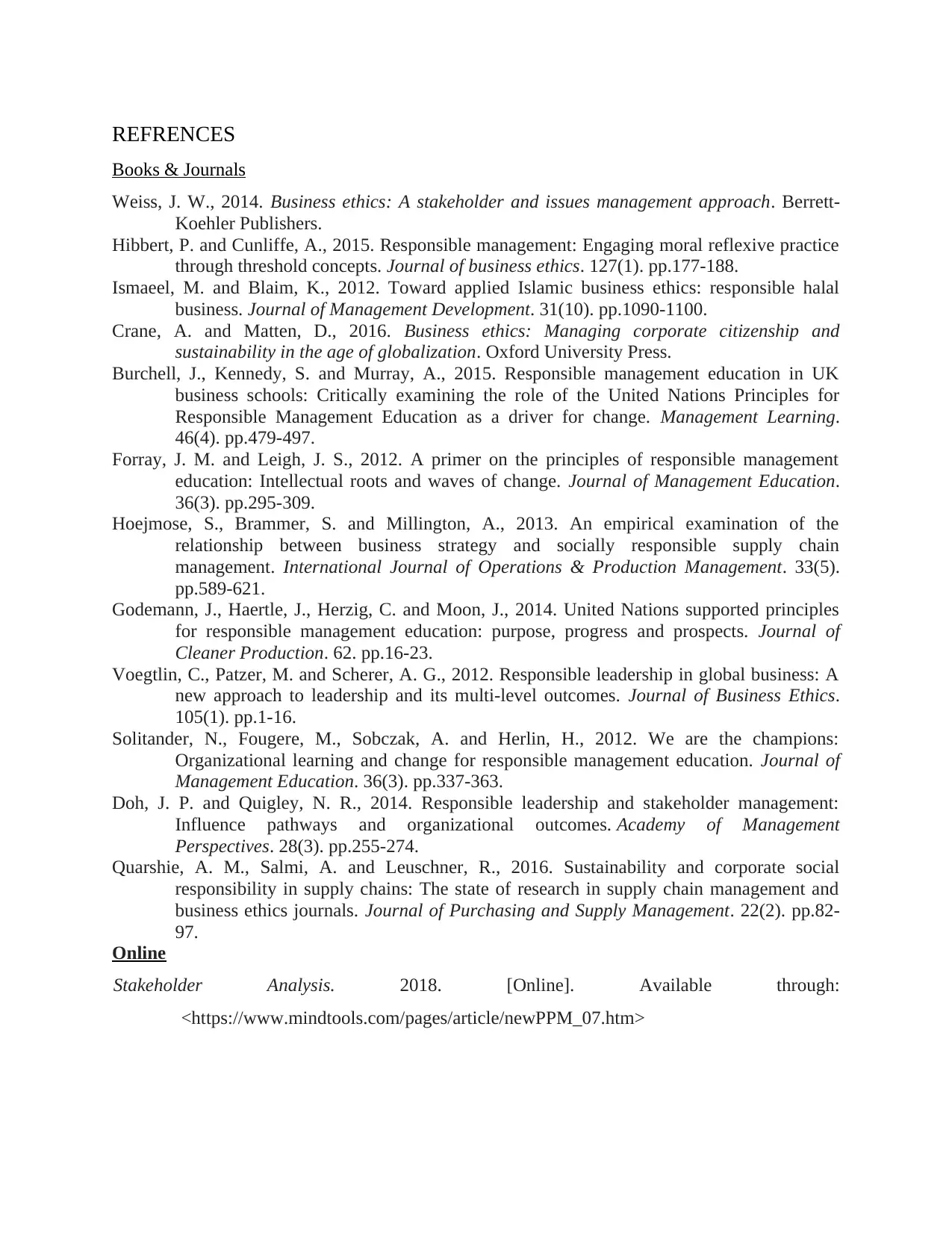
REFRENCES
Books & Journals
Weiss, J. W., 2014. Business ethics: A stakeholder and issues management approach. Berrett-
Koehler Publishers.
Hibbert, P. and Cunliffe, A., 2015. Responsible management: Engaging moral reflexive practice
through threshold concepts. Journal of business ethics. 127(1). pp.177-188.
Ismaeel, M. and Blaim, K., 2012. Toward applied Islamic business ethics: responsible halal
business. Journal of Management Development. 31(10). pp.1090-1100.
Crane, A. and Matten, D., 2016. Business ethics: Managing corporate citizenship and
sustainability in the age of globalization. Oxford University Press.
Burchell, J., Kennedy, S. and Murray, A., 2015. Responsible management education in UK
business schools: Critically examining the role of the United Nations Principles for
Responsible Management Education as a driver for change. Management Learning.
46(4). pp.479-497.
Forray, J. M. and Leigh, J. S., 2012. A primer on the principles of responsible management
education: Intellectual roots and waves of change. Journal of Management Education.
36(3). pp.295-309.
Hoejmose, S., Brammer, S. and Millington, A., 2013. An empirical examination of the
relationship between business strategy and socially responsible supply chain
management. International Journal of Operations & Production Management. 33(5).
pp.589-621.
Godemann, J., Haertle, J., Herzig, C. and Moon, J., 2014. United Nations supported principles
for responsible management education: purpose, progress and prospects. Journal of
Cleaner Production. 62. pp.16-23.
Voegtlin, C., Patzer, M. and Scherer, A. G., 2012. Responsible leadership in global business: A
new approach to leadership and its multi-level outcomes. Journal of Business Ethics.
105(1). pp.1-16.
Solitander, N., Fougere, M., Sobczak, A. and Herlin, H., 2012. We are the champions:
Organizational learning and change for responsible management education. Journal of
Management Education. 36(3). pp.337-363.
Doh, J. P. and Quigley, N. R., 2014. Responsible leadership and stakeholder management:
Influence pathways and organizational outcomes. Academy of Management
Perspectives. 28(3). pp.255-274.
Quarshie, A. M., Salmi, A. and Leuschner, R., 2016. Sustainability and corporate social
responsibility in supply chains: The state of research in supply chain management and
business ethics journals. Journal of Purchasing and Supply Management. 22(2). pp.82-
97.
Online
Stakeholder Analysis. 2018. [Online]. Available through:
<https://www.mindtools.com/pages/article/newPPM_07.htm>
Books & Journals
Weiss, J. W., 2014. Business ethics: A stakeholder and issues management approach. Berrett-
Koehler Publishers.
Hibbert, P. and Cunliffe, A., 2015. Responsible management: Engaging moral reflexive practice
through threshold concepts. Journal of business ethics. 127(1). pp.177-188.
Ismaeel, M. and Blaim, K., 2012. Toward applied Islamic business ethics: responsible halal
business. Journal of Management Development. 31(10). pp.1090-1100.
Crane, A. and Matten, D., 2016. Business ethics: Managing corporate citizenship and
sustainability in the age of globalization. Oxford University Press.
Burchell, J., Kennedy, S. and Murray, A., 2015. Responsible management education in UK
business schools: Critically examining the role of the United Nations Principles for
Responsible Management Education as a driver for change. Management Learning.
46(4). pp.479-497.
Forray, J. M. and Leigh, J. S., 2012. A primer on the principles of responsible management
education: Intellectual roots and waves of change. Journal of Management Education.
36(3). pp.295-309.
Hoejmose, S., Brammer, S. and Millington, A., 2013. An empirical examination of the
relationship between business strategy and socially responsible supply chain
management. International Journal of Operations & Production Management. 33(5).
pp.589-621.
Godemann, J., Haertle, J., Herzig, C. and Moon, J., 2014. United Nations supported principles
for responsible management education: purpose, progress and prospects. Journal of
Cleaner Production. 62. pp.16-23.
Voegtlin, C., Patzer, M. and Scherer, A. G., 2012. Responsible leadership in global business: A
new approach to leadership and its multi-level outcomes. Journal of Business Ethics.
105(1). pp.1-16.
Solitander, N., Fougere, M., Sobczak, A. and Herlin, H., 2012. We are the champions:
Organizational learning and change for responsible management education. Journal of
Management Education. 36(3). pp.337-363.
Doh, J. P. and Quigley, N. R., 2014. Responsible leadership and stakeholder management:
Influence pathways and organizational outcomes. Academy of Management
Perspectives. 28(3). pp.255-274.
Quarshie, A. M., Salmi, A. and Leuschner, R., 2016. Sustainability and corporate social
responsibility in supply chains: The state of research in supply chain management and
business ethics journals. Journal of Purchasing and Supply Management. 22(2). pp.82-
97.
Online
Stakeholder Analysis. 2018. [Online]. Available through:
<https://www.mindtools.com/pages/article/newPPM_07.htm>
1 out of 10
Related Documents
Your All-in-One AI-Powered Toolkit for Academic Success.
+13062052269
info@desklib.com
Available 24*7 on WhatsApp / Email
![[object Object]](/_next/static/media/star-bottom.7253800d.svg)
Unlock your academic potential
Copyright © 2020–2026 A2Z Services. All Rights Reserved. Developed and managed by ZUCOL.




